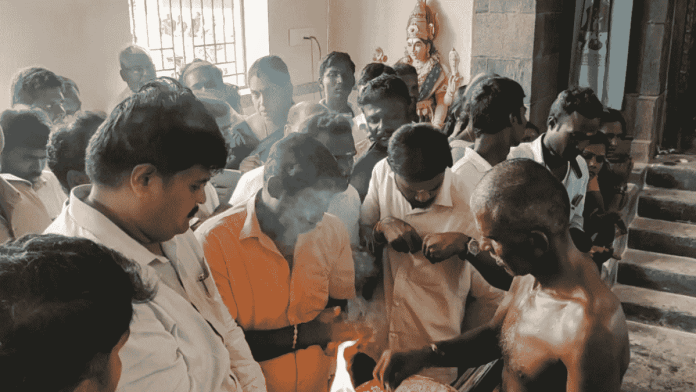Chennai: Nearly two weeks after it was sealed, Sri Kaliamman temple in Veeranampatti village in Tamil Nadu’s Karur district — where protests had erupted after a Dalit man was denied entry — was reopened for everyone, including Dalits, according to the district administration.
G. Pushpa Devi, the revenue divisional officer (RDO) of Kulithalai — the tehsil under which the village comes — closed the temple on 8 June after Urali Gounders, a sub-caste of the dominant Gounder community in the state, protested the entry of a Dalit man into the temple.
The Dalit man, P. Sakthivel, was forced to leave the temple premises on 6 June during an annual temple festival, sparking protests from the village’s Dalits.
District Collector T. Prabhushankar told ThePrint that peace talks between Urali Gounders and Dalits were held on 14 June.
“The Urali community was informed that what they did was unlawful and should arrive at a compromise. We even told them that if no compromise was arrived at then action would be taken under the Scheduled Castes and the Scheduled Tribes (Prevention of Atrocities) Act, 1989,” he said, adding that the administration had also promised Rs 1.5 crore to the village panchayat for development projects if they maintained peace.
“It was an out-of-the-box suggestion to ensure peace. Our aim was not just to uphold the Constitution but to ensure it was done in an amicable manner,” he said.
He added that the temple was reopened on 21 June and that two FIRs had been filed in connection with the incident — one for “preventing a person from entering the temple” and another “ for damage done on the RDO’s car”.
“The law will take its own course,” he said.
Also Read: How this Travancore King sparked off temple entry reforms for Dalit citizens
‘Deity for eight surrounding villages’
In response to the temple being sealed, 300 locals belonging to the Urali Gounders also held a protest. The temple goddess was a clan deity (Kuladeivam) for eight neighbouring Urali Gounder villages, they argued, demanding that the temple be reopened.
As protests escalated, the RDO’s vehicle was allegedly damaged, according to media reports.
This is far from the only case of its kind this month. On 7 June, the Villupuram district administration sealed the Dharmaraja Draupadi Amman temple in Melpadi. That move came after protests were sparked by the dominant Vanniyar caste’s refusal to allow the village’s Dalits to enter the temple premises during a festival on 7 April.
The Madras High Court, to which the Vanniyars have appealed against the temple’s sealing, has left it to the state’s Hindu Religious and Charitable Endowments Department (HRCE) to consider the possibility of performing daily pujas and rituals.
This is an updated version of the report.
(Edited by Uttara Ramasamy)
Also Read: DMK reasserting itself or still ‘anti-Hindu’? Tamil Nadu temple reforms spark political question






